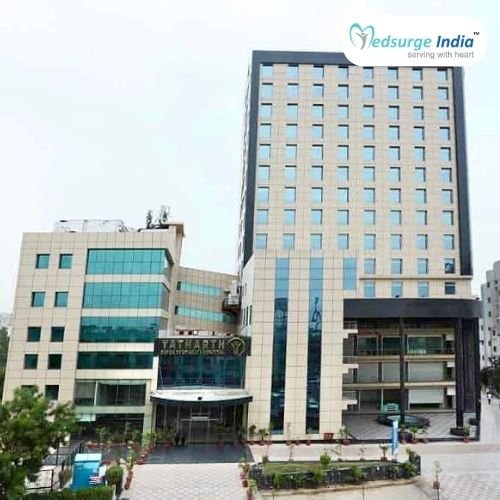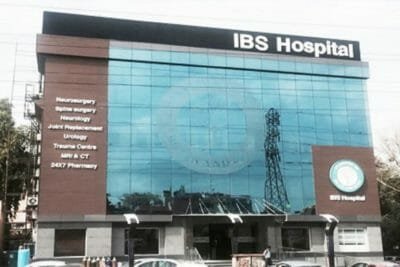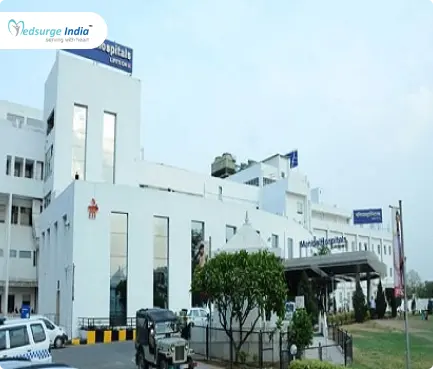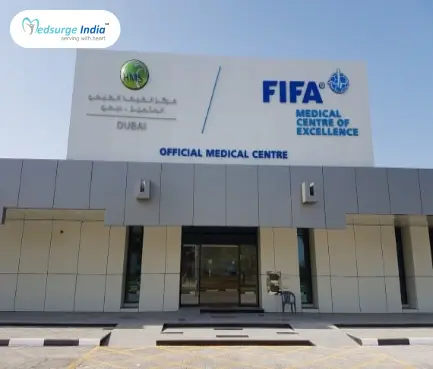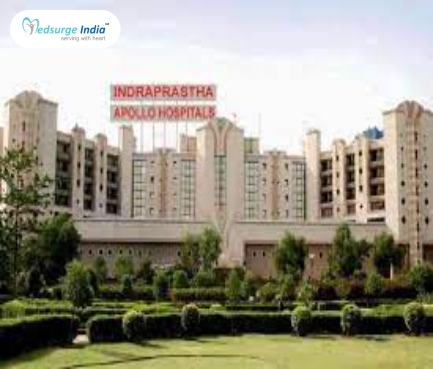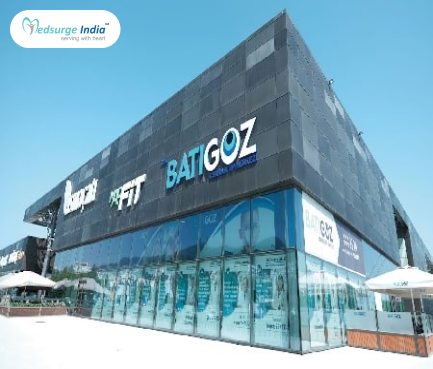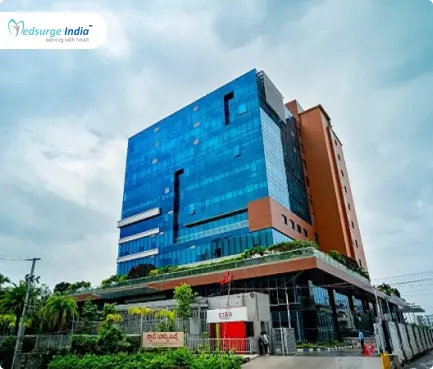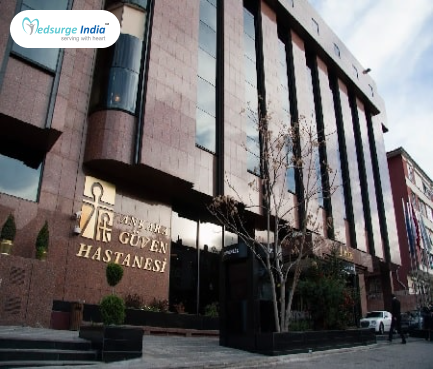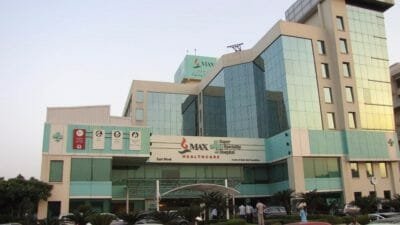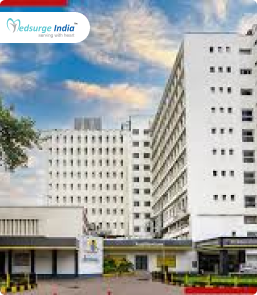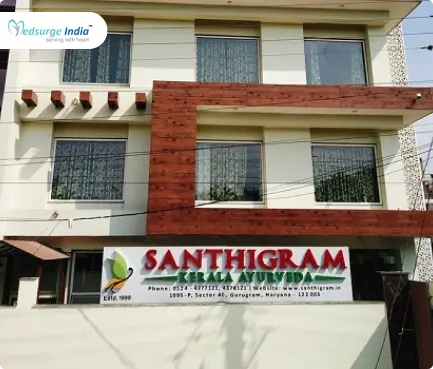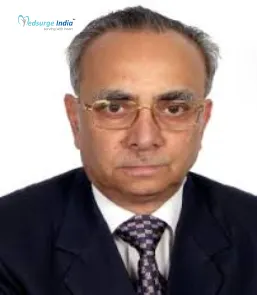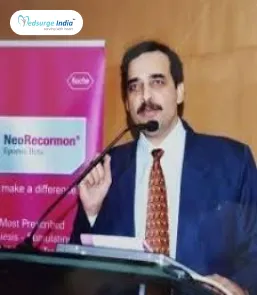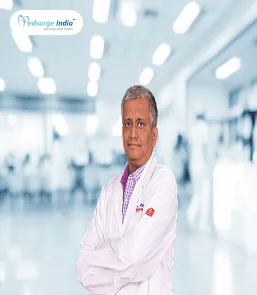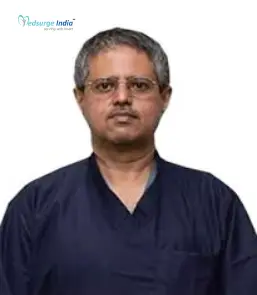
Polycystic kidney disease (PKD) is a genetic condition that causes clusters of cysts to form predominantly inside the kidneys, which over time causes the kidneys to expand and become less functional. Cysts are spherical, liquid-filled, non-cancerous sacs. The cysts can grow very large and come in different sizes. Having many cysts or large cysts can damage your kidneys. For Polycystic Kidney Disease treatment in India, medications are given to control blood pressure, pain relievers to relieve the pain, and cyst removal is performed. A kidney transplant may also be required in severe cases.
The Polycystic Kidney Disease Treatment Cost in India depends upon the experience of the Nephrologist and the duration of stay in the hospital
What Is Polycystic Kidney Disease?
In the kidneys, cysts (fluid-filled growths) form due to polycystic kidney disease (PKD). Since PKD is a hereditary disorder, you must have a gene that has been mutated to develop the condition.
Simple kidney cysts, which are typically not harmful, are not the same as PKD. A severe form of chronic kidney disease is PKD. The cysts may cause the kidneys to expand and become incapable of removing waste from the bloodstream. PKD can lead to kidney failure.
There are two types of polycystic kidney disease:
Autosomal dominant polycystic kidney disease (ADPKD): The most prevalent type of polycystic kidney disease is ADPKD. In adulthood, between the ages of 30 and 50, it is typically diagnosed. ADPKD is usually diagnosed in adulthood, between the ages of 30 and 50, but it may occur in early childhood or adolescence.
Infantile polycystic kidney disease (ARPKD): It is a rare variant of autosomal recessive polycystic kidney disease. It results in abnormal kidney growth during pregnancy or soon after birth.
What Are the Symptoms of Polycystic Kidney Disease?
Consult your doctor if you experience any polycystic kidney disease symptoms. Check with your physician to learn more about screening for polycystic kidney disease if you have a first-degree relative who has the condition, such as a parent, sibling, or child.
Symptoms of polycystic kidney disease include:
- Higher blood pressure
- Side or back pain
- Urine with blood in it
- A feeling of fullness in your abdomen
- Your abdomen has grown larger as a result of your enlarged kidneys.
- Headaches
- Renal stones
- kidney failure
- Infections of the kidneys or urinary tract
- Fluttering or pounding in the chest
For both adults and children with PKD, major complications might arise
Adults could grow:
- Brain Aneurysms
- Colon Problems
- Liver Cysts
- Pancreatic Cysts
- Heart Valve Problems
Babies could develop:
- Breathing problems due to underdeveloped lungs
- Liver problems
- Colon problems
What Are the Causes of Polycystic Kidney Disease?
Genetic mutations are the reason for causing polycystic kidney disease. The condition typically spreads from parents to their offspring. You, therefore, inherit PKD. But occasionally, genes will randomly change or mutate. PKD can affect people of various ages, races, and ethnicities. Both men and women can get it.
The two main types of polycystic kidney disease, each brought on by a specific genetic flaw, are as follows:
- ADPKD: The disease can only be passed to the children if one parent already has it. Every child has a 50% chance of developing ADPKD if one parent possesses it. The majority of polycystic kidney disease cases fall within this category.
- ARPKD: To pass on this form of the disease, both parents must have genetic abnormalities. Each child has a 25% chance of contracting the disease if both parents have the gene for it.
Polycystic Kidney Disease Treatment Cost in India
Polycystic Kidney Disease Treatment Cost in India on average starts from USD 800, the pricing of the treatment will vary depending on the patient’s condition and other factors.
Estimated prices depending on different cities in India
| Cities | Starting Price |
| Delhi | USD 800 |
| Gurgaon | USD 800 |
| Noida | USD 800 |
| Mumbai | USD 900 |
| Hyderabad | USD 800 |
| Chennai | USD 800 |
| Kolkata | USD 800 |
| Bangalore | USD 900 |
Please keep in mind that prices of Polycystic Kidney Disease Treatment Cost in India will vary depending on various factors.
Factors That Can Affect Polycystic Kidney Disease Treatment Cost in India
The standard and grade of medical care and amenities are comparable to those of the most prestigious healthcare facilities in the world, even when the expense of lodging, meals, and transportation is taken out. The following here are some variables that can affect Polycystic Kidney Disease Treatment Cost in India:
- Medication costs.
- Duration of treatment.
- Geographical location.
- Hospitalization expenses.
- Government policies and subsidies.
- Medical tourism packages.
- Hospital reputation and infrastructure.
- The expertise and experience of medical professionals.
- The type and frequency of diagnostic procedures.
- The choice of treatment modality.
Under the direction of the most skilled physicians, Medsurge India provides patients with the lowest Polycystic Kidney Disease Treatment Cost in India.
How the Diagnosis of Polycystic Kidney Disease is Done?
Certain tests can determine the size and number of kidney cysts you have and the amount of healthy kidney tissue you possess if you have polycystic kidney disease, including:
Ultrasound:
A transducer, which resembles a wand, is put on your body during an ultrasound. Similar to sonar, it produces sound waves that are reflected back to the transducer. The reflected sound waves are converted by a computer into pictures of your kidneys.
CT Scan:
You are led into a large, doughnut-shaped machine that projects thin X-ray beams through your body as you are lying on a mobile table. Your kidneys can be seen in cross-section by your doctor.
MRI Test:
Magnetic fields and radio waves produce cross-sectional images of your kidneys as you are lying within a sizable cylinder.
Additionally, a medical professional might advise genetic testing. The mutated genes that lead to PKD can be found through a blood or saliva test.
Get Free Cost Estimation
Procedure
What Is the Treatment for Polycystic Kidney Disease?
There is currently no treatment for PKD. But there is a huge amount of research going on. According to recent studies, cyst formation can be slowed down by drinking plain water all day long and avoiding beverages with caffeine. Research is also helping us understand the genetic basis of PKD.
Further studies are required before these medicines may be utilized on patients, however, studies have also suggested that some medications may reduce the progression of kidney disease in PKD. Numerous supportive treatments can be used in the meantime to help persons with PKD to manage their symptoms, decrease the growth of cysts, and prevent or prevent the loss of kidney function. These consist of:
- Careful blood pressure management
- Bladder or kidney infection treatment with antibiotic
- Intake of plenty of fluids when the first sign of blood in the urine is noticed pain medication (talk to your doctor about which over-the-counter medicines are safe to take if you have kidney disease)
- A healthy lifestyle that includes quitting smoking, exercising, controlling one’s weight, and consuming less salt
- Consuming a lot of plain water throughout the day and avoiding all beverages with caffeine
Tolvaptan is a novel medication that the FDA approved in April 2018 to treat autosomal dominant polycystic kidney disease (ADPKD). In individuals who are at risk for this type of PKD, the medication can be administered to assist delay the deterioration in kidney function. If you would want to learn more about this treatment and if it is appropriate for you, you can speak with a healthcare expert.
Kidney Failure and Transplant Options
Kidney failure is one of the most serious complications of PKD. At this point, the kidneys are unable to:
- Filter waste products
- Maintaining fluid balance
- To get stable blood pressure
When this happens, your doctor discusses alternatives with you, some of which can involve a kidney transplant or dialysis procedures that serve as artificial kidneys.
Kidney transplantation is another beneficial process in kidney cancer treatment. Speaking to your nephrologist can help you weigh your options. You can also ask what medications and treatments can help you live as well as possible in the meantime.
Read More – Everything You Need to Know About Kidney Transplant
Suggestion
Cysts develop in the kidneys as a result of genetic polycystic kidney disease (PKD). The cysts may cause the kidneys to expand and impair renal function. Adults are most commonly affected by PKD. However, a deadly type of PKD can occasionally affect infants. Treatment improves kidney function and reduces symptoms. Most PKD sufferers eventually require dialysis or a kidney transplant.
A primary care physician will probably be your first stop. However, a physician who focuses on renal health may be recommended to you (a nephrologist). Even if blood tests reveal that your kidney function is still normal, it may be advantageous to begin a specialist treatment early in the course of the disease.
80% of women with PKD experience successful, uneventful pregnancies. The risk of significant problems for both the fetus and the mother is higher in some PKD patients.
The Most Important Frequently Asked Questions
Q: Is polycystic kidney disease a dangerous condition?
A: Serious side effects of the disease include renal failure and high blood pressure. The severity of PKD varies widely, and some consequences can be avoided. Treatments and a change in lifestyle may be able to lessen problems and harm to your kidneys.
Q: How long will someone with polycystic kidney disease live?
A: One in 1000 persons worldwide has autosomal dominant polycystic kidney disease, a hereditary condition that raises the risk of intracranial aneurysms. Depending on the subtype, a patient with ADPCKD has an average life expectancy of 53 to 70 years.
Q: Can a polycystic kidney be removed?
A: For most individuals with several or extremely big cysts, laparoscopy and cystectomy is the preferred course of action. For those with adult polycystic kidney disease and those who need to remove a lot of cysts, the laparoscopic method is preferable (APCKD).
Q: With polycystic kidney disease, is a kidney transplant possible?
A: A condition called polycystic kidney disease (PKD) causes your kidneys to form and enlarge a lot of fluid-filled sacs called cysts. Almost always, it is inherited. This condition may cause renal failure and decrease kidney function. You will require dialysis or, ideally, a kidney transplant if you develop renal failure.
Q: What treatments for kidney cysts does a urologist deal with?
A: Cyst Puncture: A medical needle is inserted into the skin and into the kidney cyst by a doctor. Using a specialist medical solution, a doctor may take action to stop a recurrence once the cyst’s fluid has been removed.
Top Hospitals for Polycystic Kidney Disease Treatment in India
Top Doctors for Nephrology
Dr. Vijay Kumar Sinha
Associate Director , MBBS, MD, DNB
Experience: 11 years of experience
Noida , India
Dr. Sunil Dharmani
Senior Consultant
Experience: 26+ years of experience
NH MMI Narayana Superspeciality Hospital, Lalpur, Raipur
Raipur, India
Dr. Mahesh Prasad
Consultant
Experience: 21 years of experience
P.D Hinduja Hospital & Medical Research Centre, Mumbai
Mumbai, India
Dr. Saurabh Pokhriyal
Director
Experience: 20 years of experience
Manipal Hospitals Dwarka, Delhi
New Delhi, India
Dr. Mayoor Vasant Prabhu
Senior Consultant
Experience: 25+ years of experience
KMC Hospital, Hampankatta, Mangaluru
Mangaluru, India
Dr. Amit Kumar Yadav
Consultant
Experience: 16 years of experience
BLK Super Speciality Hospital, New Delhi
New Delhi, India
Dr. Sidharth Kumar Sethi
Senior Consultant
Experience: 16 years of experience
Medanta – The Medicity, Gurgaon
Gurgaon, India
Dr. (Lt. Gen) Prem P Varma
HOD
Experience: 28 years of experience
Primus Super Speciality Hospital, New Delhi
New Delhi, India
Dr. Aswini Kumar Panigrahi
Consultant
Experience: 16 years of experience
Apollo Hospitals, Jubilee Hills Hyderabad
Hyderabad, India
Dr. Rajiv Sinha
Senior Consultant
Experience: 26 years of experience
AMRI Hospital, Kolkata (Mukundapur)
Kolkata, India
Dr. Shyam Bihari Bansal
Consultant
Experience: 21 years of experience
Medanta – The Medicity, Gurgaon
Gurgaon, India
Dr. Yashavantha Kumar K Y
Senior Consultant
Experience: 10+ years of experience
Narayana Multispeciality Hospital, R S Naidu Nagar, Mysore
Mysore, India
Dr. Ravi K R
Senior Consultant
Experience: 20+ years of experience
Sahyadri Narayana Multispeciality Hospital, Harakere, Shimoga
Shimoga, India
Dr. Vijaya Rajakumari
Consultant
Experience: 32 years of experience
Indraprastha Apollo Hospital, New Delhi
New Delhi, India



